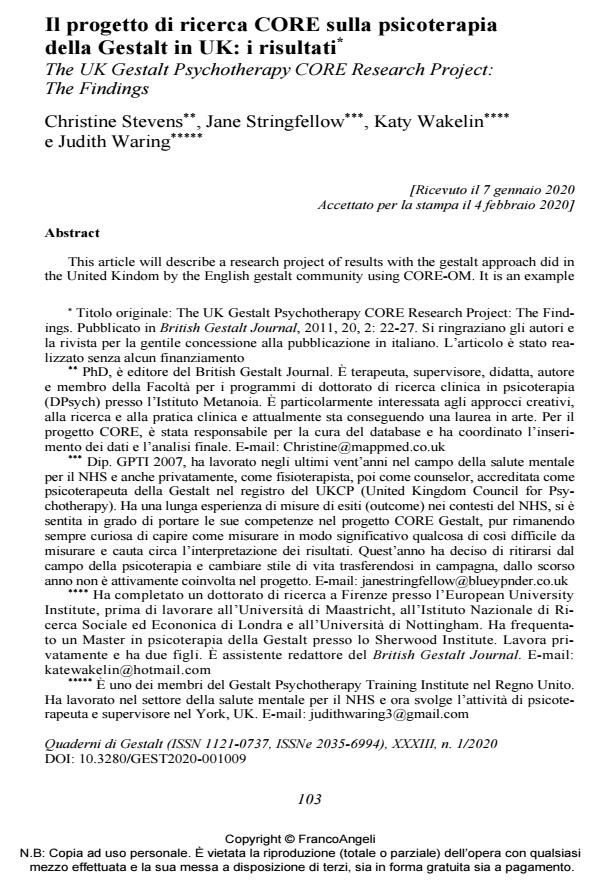The UK Gestalt Psychotherapy CORE Research Project: The Findings
Journal title QUADERNI DI GESTALT
Author/s Christine Stevens, Jane Stringfellow, Katy Wakelin, Judith Waring
Publishing Year 2020 Issue 2020/1
Language Italian Pages 16 P. 103-115 File size 198 KB
DOI 10.3280/GEST2020-001009
DOI is like a bar code for intellectual property: to have more infomation
click here
Below, you can see the article first page
If you want to buy this article in PDF format, you can do it, following the instructions to buy download credits

FrancoAngeli is member of Publishers International Linking Association, Inc (PILA), a not-for-profit association which run the CrossRef service enabling links to and from online scholarly content.
This article will describe a research project of results with the gestalt approach did in the United Kindom by the English gestalt community using CORE-OM. It is an example of how we can do research rigorously and with a voluntary contribution. The Clinicians are now more aware that doing research in psychotherapy is important in order not to be self-referential and to demonstrate scientifically whether psychotherapy works and how. The CORE-OM System (clinical outcome routine evaluation - outcome measurement) is based on a research paradigm of Practice-Based Evidence. It is validated, is the most widely used, internationally and nationally, by therapy approaches and within psychotherapy services. Since it is atheoretical, easy to use and collects quantitative data, it encourages clinicians to do research. We publish this article to introduce psychotherapy research to Italian Gestalt therapists and to encourage them to do research. Furthermore, we publish it because, start-ing from this research, the Gestalt Community decided to repeat the outcome research with CORE-OM in Italy (La Rosa et al., 2019). This paper will describe the ground in the UK, briefly the tool, the research project, the data description and the results. Also, it has dis-cussion about limits and resources of this research. The Gestalt sample in this study was compared with the effectiveness of same studies with cognitive-behavioural, person-centered and psychodynamic therapies with CORE-OM. The article also shows the addi-tional standard measures used in the CORE-OM literature to access the efficacy of therapy, reliable and clinically significant improvement over other studies. The results show that Gestalt psychotherapists are as effective as therapists trained in other approaches working in national health services and primary care.
Keywords: Research in Gestalt Therapy, outcome research, CORE-OM, research in psy-chotherapy, treatment effectiveness.
Christine Stevens, Jane Stringfellow, Katy Wakelin, Judith Waring, Il progetto di ricerca CORE sulla psicoterapia della Gestalt in UK: i risultati in "QUADERNI DI GESTALT" 1/2020, pp 103-115, DOI: 10.3280/GEST2020-001009